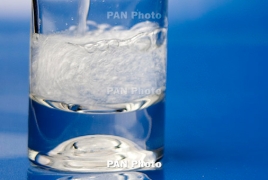
Armen Muradyan, rector of Yerevan State Medical University, advised the public to avoid sweetened and carbonated beverages during the summer, urging people to drink water and consume water-rich foods. He shared this advice on his Facebook page.
He noted that the average Armenian consumes about 27 liters of sugary carbonated drinks annually—a relatively low figure compared to high-consumption countries (100–300 liters per person per year).
“To prevent dehydration during summer, don’t wait until you’re thirsty. Drink water regularly and eat water-rich foods,” Muradyan wrote. He suggested using a simple formula to calculate daily fluid needs: approximately 30–40 ml of water per kilogram of body weight. For example, a person weighing 70 kg needs 2.1–2.8 liters of water daily.
In hot weather, fluid requirements rise due to heat, sweat, and dehydration risk. Factors like body weight, physical activity, health status, and the environment influence hydration needs. Average daily recommendations for adults range from 2.5 to 3.5 liters, increasing with exertion or prolonged sun exposure. Signs of proper hydration include pale urine, lack of dry mouth, and frequent urination.
Muradyan listed several reasons to avoid sugary sodas in summer:
- Dehydration risk: High sugar content may cause fluid loss. Sugar acts as a diuretic, and caffeine (often in sodas) can mildly dehydrate.
- Doesn’t quench thirst: Sugary sodas disrupt water balance more than they help.
- High calorie and sugar load: One soda bottle can contain 7–10 teaspoons of sugar, stressing the body in hot weather, raising blood sugar, and causing fatigue. Regular use can lead to weight gain and diabetes.
- Bloating and digestive issues: Carbonation may cause bloating and discomfort, especially in heat-sensitive bodies.
Better alternatives include:
- Regular water (cold or room temperature)
- Lemon- or lime-infused water
- Unsweetened homemade iced tea
- Water-rich fruits and vegetables (e.g., watermelon, cucumber, melon)
Muradyan also warned against soda consumption by children. Though there’s no legal age limit, pediatric guidelines advise:
- Under 3 years: Strictly avoid. Only breastmilk, formula, and water are recommended.
- Ages 3–12: Strongly limit due to high sugar, dental risks, behavioral impacts, and obesity concerns.
- Teens (13–18): While more resilient, teens often overconsume sugary and energy drinks. WHO advises limiting sugar intake to less than 10% of daily calories—a level easily exceeded by one soda.
In 2024, Armenia’s total soda consumption was about 78.9 million liters, with per capita household consumption at 27.3 liters. Most of the market (≈96%) is home-based. This places Armenia well below high-consuming regions like North America, Europe, and Latin America.

